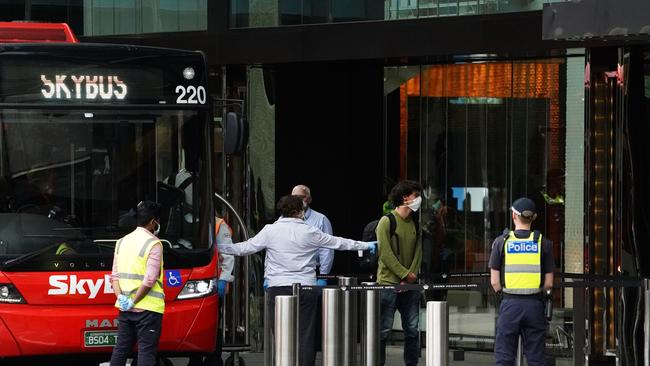Andrew Bolt: Australians could be back at work in two weeks if we’re pragmatic
If we keep our blunderbuss approach of closing business and self-isolating, the suffering from coronavirus will be enormous. So here are five reasons why we can stop forcing millions of fit, young and frustrated Aussies to stay home, writes Andrew Bolt.

Things have changed with this coronavirus panic. Now Australians can be – must be – back at work within two weeks.
If we keep our blunderbuss approach of closing thousands of business and telling all Australians to stay home, the suffering will be enormous.
A million people will lose their jobs. Many will lose their savings. Despair, suicides and social disorder will rise. Already the Morrison Government reports more domestic violence.
So let me outline good news – five reasons why we can now stop forcing millions of fit, young and frustrated Australians to stay at home.
OUR HOSPITALS ARE READY
Yes, we needed this crackdown to buy time for hospitals to prepare for a virus we didn’t understand and were told could swamp our intensive care beds.
But now the Deputy Chief Medical Officer says we’ll have enough beds, particularly as we triple their number. Extra ventilators are being rushed in.
THE VIRUS IS SLOWING
This virus was spreading frighteningly fast – 25 to 35 per cent more cases every day.
Now it’s slowed to around 13 and 15 per cent for four straight days, despite more aggressive testing to find more sick people.
That rate is still too high, but does suggest the virus is not about to overwhelm us, and many Australians are now taking precautions – keeping their distance and washing hands.
THE VIRUS ISN’T AS DEADLY AS THOUGHT
The World Health Organisation claims the coronavirus kills 3.4 per cent of infected people. Our government said 1 per cent, sparking claims by academics and reporters that between 96,000 and 150,000 Australians could die.
In fact our death toll is still (as of midday yesterday) just 16, all old and many already very sick with illnesses such as cancer. That’s a mortality rate so far of under 0.4 per cent among just those we know are infected.
Dr Anthony Fauci, Donald Trump’s top coronavirus advisor, has just co-authored a study suggesting the virus could be even less deadly.
If we assume that tests exclude the many people who don’t even know they’re sick, Fauci says, the coronavirus “may ultimately be more akin to those of a severe seasonal influenza which has a case fatality rate of approximately 0.1 per cent.”
Yes, this is still a dangerous virus. Look at Italy. But just 16 dead here?
This virus now looks much less deadly than feared, and is highly selective, killing mostly the old – often people already close to death.

WE HAVE CLOSED THE DOOR
We have finally, belatedly, closed the door on our main source of infection – people flying or sailing in from overseas.
As of now, all travellers must go straight to a hotel guarded by the army to serve an enforced two-week quarantine.
Police and the army are also stepping up checks of people meant to be in home quarantine. Again, too late, and still not enough. But it’s the start of a new approach.
THERE IS ANOTHER WAY THAT WORKS
The choice is not between doing it our way or doing nothing. It is between pragmatic and panic – doing more of what helps and less of what hurts.
Taiwan has a similar population to Australia’s, but fewer than 300 cases and just two deaths. What’s more, it’s fought the virus without closing down shops, restaurants or markets.
It’s instead been much tougher on border controls – Australian Mat Carney said he’d had his temperature checked four times when flying out of Taiwan last week but not once when arriving in Brisbane.
Taiwan also tracks quarantine so closely that people leaving home don’t get halfway down the street before getting a phone call telling them to go back.
Meanwhile shops and offices test the temperature of customers and hands out sanitiser before letting them enter.
All this suggests our governments can now change course.
They must stop trying to quarantine millions of healthy and younger Australians who are desperate to get back to work and are highly unlikely to die from this virus.
They should quarantine just the potentially infectious and isolate the vulnerable – the frail and people over 65.
This means getting tougher in testing people and enforcing quarantine. It means creating an army of helpers to protect the elderly – to keep them fed, tended and entertained at home – while preparations for mass production of a vaccine the second that a trial in Melbourne next month starts to look promising.
This can be done in two weeks. Then let the rest of us get back to work.
READ MORE:
BOLT: WE CAN’T LET THE CURE BE WORSE THAN THE DISEASE

